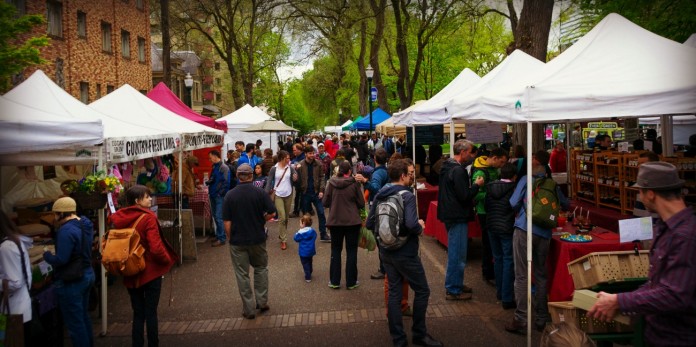
Demand for local food is on the rise, and with good reason- Fresh and healthy locally grown food is good for eaters, the economy and the environment. It increases farm income and creates profitable new markets for local producers. Local food brings people together, builds community and strengthens our food system.
10 Reasons to love local foods:
- Local foods boost small farm income. According to the USDA Census of Agriculture, 85% of local foods sales come from farms with less than $75,000 annual farm income. Local foods producers are typically small farms with limited production levels. Selling local allows small farms to operate profitable businesses on less land, with fewer inputs.
- Local foods pay producers more. Selling local cuts the cost of middle men. Farmers retain more of the selling price. Farmers also receive a better price-per-unit selling local foods direct to consumers than they do selling wholesale.
- Local foods create new markets. Increased interest and demand for local foods creates new markets for farms and food businesses. Farmers’ markets, food hubs and buying clubs are one-stop-shops for consumers to purchase foods from several farms. Community Supported Agriculture (CSA) supports local producers through membership subscriptions.
- Local foods provide access in food deserts. Food deserts exist in urban and rural areas. Low income levels and health concerns in these areas further complicate the problem of food insecurity. Farmers’ markets and pop-up produce stands are a solution to food insecurity. These portable markets deliver healthy local food where it is needed most.
- Local foods meet nutritional needs of low-income households. Nutrition assistance programs such as SNAP, WIC and senior food vouchers are redeemable at participating local foods markets.
- Local foods are healthier. Imported food loses nutrients during travel and merchandising. Foods grown and sold close to home maintain a high level of nutrients.
Nutritionists recommend eating more whole foods and less processed foods for better health. Most sodium and sugar in the food supply comes from processed foods. Local fruits, vegetables and proteins are typically sold as whole foods or minimally processed. Eating local foods promotes healthier diets by helping eaters avoid excess salt and sugar in processed foods.
- Local foods create community connections. Local food brings people together and builds community. It gives an area identity and instills a sense of pride in growers and eaters alike.
Local food provides a platform for community education. Farmers, health specialists, local business owners, educators and chefs can showcase local foods to demonstrate sustainable production, home food preparation and healthy eating.
- Local food saves energy. It takes energy to produce, transport, process, pack and store food. The Natural Resource Conservation Service reports the U.S. food system accounts for 15.7% of total U.S. energy consumption (2007). According to the Environmental Protection Agency, the agricultural industry is responsible for 9% of greenhouse gas emissions (2014). Local food production still requires energy and emits CO2, but often reduces the amount of energy required to get food from farm to fork.
Local food production saves energy in 3 ways: First, the majority of local foods producers are small farms. Small farms are more likely to practice soil and water conservation, and utilize sustainable farming methods like cover crops and composting. Second, local foods are typically grown and sold in-season, without artificial light or heat. Last, local food travels less miles and produces fewer emissions.
- Local foods are good for the economy. An estimated $6.1 billion dollars was spent on local food in 2012 according to the U.S. Census of Agriculture. Dollars spent on local foods circulate through the local economy, fueling growth and creating opportunity.
- Local foods strengthen the food system. A strong food system starts at home. When consumers buy local they invest in local farms and food businesses. Profits keep local land in production, securing a continual supply of food for the local market.












